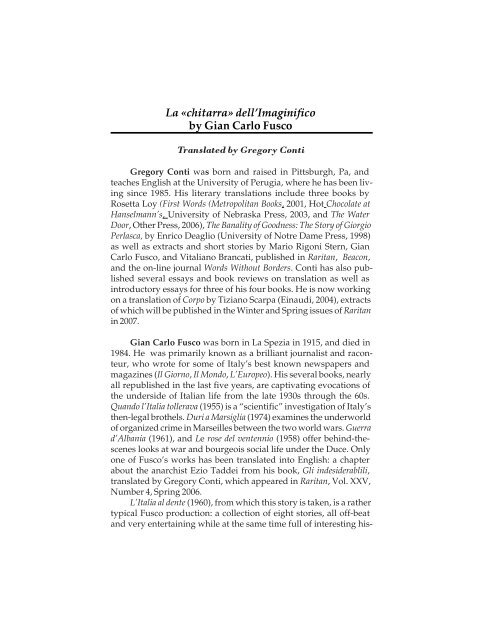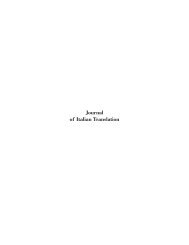Journal of Italian Translation - Brooklyn College - Academic Home ...
Journal of Italian Translation - Brooklyn College - Academic Home ...
Journal of Italian Translation - Brooklyn College - Academic Home ...
You also want an ePaper? Increase the reach of your titles
YUMPU automatically turns print PDFs into web optimized ePapers that Google loves.
La «chitarra» dell’Imaginifico<br />
by Gian Carlo Fusco<br />
Translated by Gregory Conti<br />
Gregory Conti was born and raised in Pittsburgh, Pa, and<br />
teaches English at the University <strong>of</strong> Perugia, where he has been living<br />
since 1985. His literary translations include three books by<br />
Rosetta Loy (First Words (Metropolitan Books, 2001, Hot Chocolate at<br />
Hanselmann’s, University <strong>of</strong> Nebraska Press, 2003, and The Water<br />
Door, Other Press, 2006), The Banality <strong>of</strong> Goodness: The Story <strong>of</strong> Giorgio<br />
Perlasca, by Enrico Deaglio (University <strong>of</strong> Notre Dame Press, 1998)<br />
as well as extracts and short stories by Mario Rigoni Stern, Gian<br />
Carlo Fusco, and Vitaliano Brancati, published in Raritan, Beacon,<br />
and the on-line journal Words Without Borders. Conti has also published<br />
several essays and book reviews on translation as well as<br />
introductory essays for three <strong>of</strong> his four books. He is now working<br />
on a translation <strong>of</strong> Corpo by Tiziano Scarpa (Einaudi, 2004), extracts<br />
<strong>of</strong> which will be published in the Winter and Spring issues <strong>of</strong> Raritan<br />
in 2007.<br />
Gian Carlo Fusco was born in La Spezia in 1915, and died in<br />
1984. He was primarily known as a brilliant journalist and raconteur,<br />
who wrote for some <strong>of</strong> Italy’s best known newspapers and<br />
magazines (Il Giorno, Il Mondo, L’Europeo). His several books, nearly<br />
all republished in the last five years, are captivating evocations <strong>of</strong><br />
the underside <strong>of</strong> <strong>Italian</strong> life from the late 1930s through the 60s.<br />
Quando l’Italia tollerava (1955) is a “scientific” investigation <strong>of</strong> Italy’s<br />
then-legal brothels. Duri a Marsiglia (1974) examines the underworld<br />
<strong>of</strong> organized crime in Marseilles between the two world wars. Guerra<br />
d’Albania (1961), and Le rose del ventennio (1958) <strong>of</strong>fer behind-the-<br />
scenes looks at war and bourgeois social life under the Duce. Only<br />
one <strong>of</strong> Fusco’s works has been translated into English: a chapter<br />
about the anarchist Ezio Taddei from his book, Gli indesiderablili,<br />
translated by Gregory Conti, which appeared in Raritan, Vol. XXV,<br />
Number 4, Spring 2006.<br />
L’Italia al dente (1960), from which this story is taken, is a rather<br />
typical Fusco production: a collection <strong>of</strong> eight stories, all <strong>of</strong>f-beat<br />
and very entertaining while at the same time full <strong>of</strong> interesting his-
















